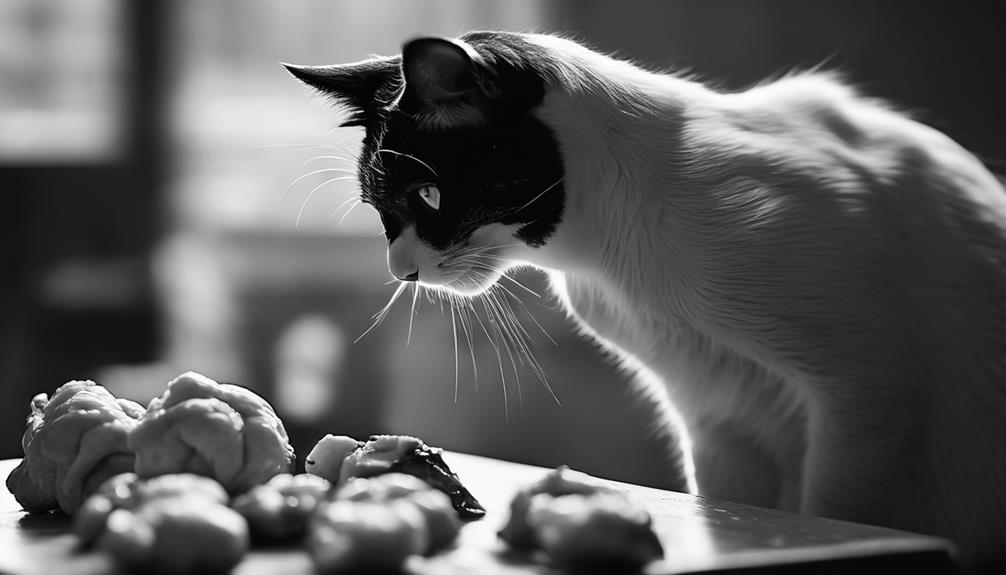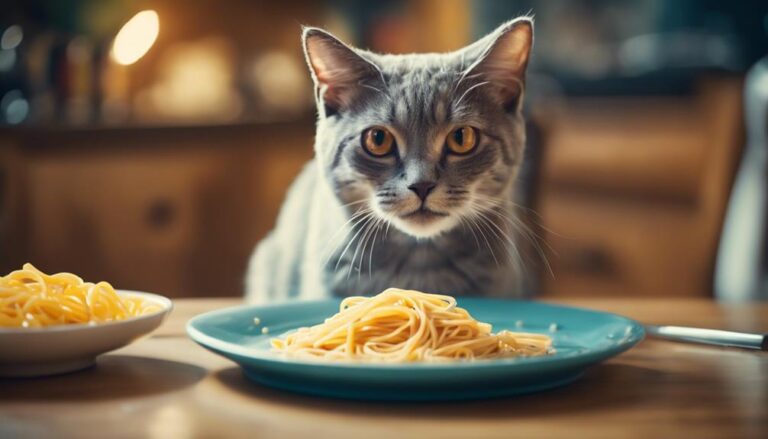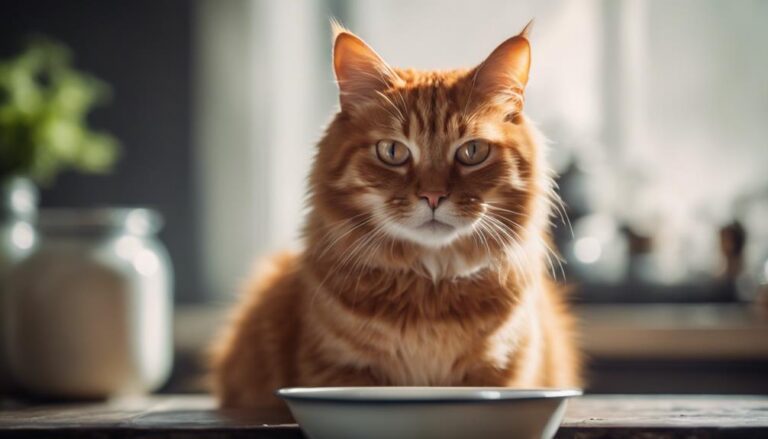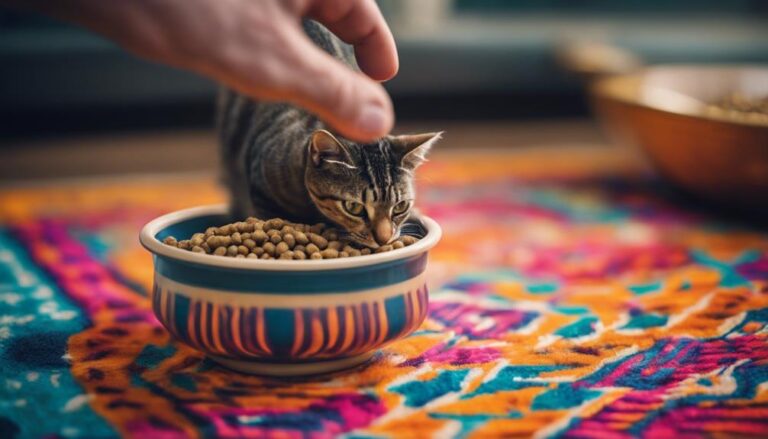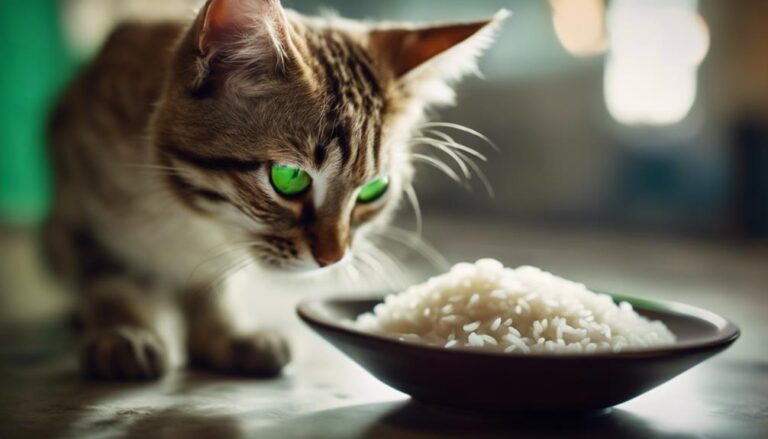You may have wondered about the suitability of feeding your feline companion raw chicken. While this practice has its potential advantages, it also raises concerns regarding your cat's health and well-being. Before making any decisions, it's crucial to consider various factors to ensure that your cat's diet is balanced and meets their nutritional needs. So, what exactly should you keep in mind when contemplating this dietary choice for your beloved pet?
Risks of Feeding Cats Raw Chicken
Feeding your cat raw chicken poses significant risks due to potential bacterial contamination and bone-related hazards. Raw chicken can harbor harmful bacteria like Salmonella, which may lead to infections in cats. Moreover, the bones in raw chicken can splinter, posing choking or internal injury risks to your feline friend.
While raw chicken is a source of protein, it alone may not provide all the essential nutrients necessary for a balanced feline diet. Cats, for instance, require taurine for heart health, a vital nutrient that could be lacking in raw chicken. If your cat experiences intestinal upset after consuming raw chicken, it's crucial to seek veterinary advice promptly to ensure your pet's well-being.
Considering these risks, it's essential to carefully assess the potential dangers associated with feeding your cat raw chicken before making dietary choices for your furry companion.
Nutritional Concerns With Raw Chicken
When considering feeding your cat raw chicken, be aware of potential bacterial risks such as salmonella.
Raw chicken is a good source of protein for your cat's muscle and bone health.
It's crucial to be mindful of salmonella concerns and ensure a balanced diet when incorporating raw chicken into your cat's meals.
Raw Chicken Bacteria Risks
Raw chicken consumption carries inherent risks due to bacterial contamination and potential nutritional imbalances for cats. Feeding cats raw chicken exposes them to harmful bacteria like Salmonella and E. coli, which can lead to health issues. Cats are susceptible to pathogens present in raw meat, making it important to handle chicken carefully to prevent cross-contamination.
To mitigate these risks, make sure they meet their nutritional needs through a balanced diet. Cooking chicken thoroughly before feeding it to your cat can eliminate the bacterial dangers associated with raw meat consumption. Remember, proper hygiene practices are crucial when handling raw chicken to safeguard both your cat's and your health.
Protein Content in Chicken
Considering cats' dietary requirements, the protein content in chicken plays a vital role in supporting their muscle and bone health. Raw chicken is rich in protein, essential for cats' bone formation and muscle strength. This protein meets cats' dietary requirements, aiding in their growth and development.
The amino acids found in chicken protein are crucial for cats' overall well-being and energy levels. Feeding cats raw chicken provides a biologically appropriate diet, ensuring they receive the necessary nutrients for optimal health.
Salmonella Concerns With Chicken
Incorporating raw chicken into your cat's diet raises concerns about potential Salmonella contamination and associated health risks. Cats can eat raw meat, but it's crucial to consider the presence of harmful bacteria like Salmonella, which can lead to severe health issues such as vomiting, diarrhea, lethargy, and dehydration.
To ensure the safety of your feline companion, cooking chicken thoroughly is essential to eliminate the risk of Salmonella contamination. Additionally, raw chicken may not offer a complete and balanced nutritional profile for cats, so it might be necessary to supplement their diet accordingly.
Before introducing raw chicken to your cat, consult with a veterinarian to safeguard their well-being and address any potential nutritional concerns.
Potential Dangers of Chicken Bones
Beware of chicken bones as they can splinter, posing a risk of internal injuries to your cat.
Cooked bones are especially hazardous due to their brittle nature, increasing the likelihood of choking or digestive blockages.
To safeguard your cat's well-being, avoid feeding them any poultry bones and closely monitor them when consuming chicken.
Bone Splintering Risks
When cats chew on chicken bones, there's a significant risk of splintering, potentially leading to choking or internal injuries. Cooked bones are safer for cats as they're softer compared to raw bones. Raw chicken bones should be avoided to prevent harm to your cat's digestive tract.
The risk of bone splintering increases in cats that aggressively chew on bones. It's crucial to note that all types of poultry bones, including chicken bones, shouldn't be given to cats to avoid potential dangers.
Be cautious when offering any bones to your cat to prevent the risks associated with splintering and potential harm to their well-being.
Choking Hazard Alert
When cats chew on chicken bones, they face a high risk of choking due to the bones' propensity to splinter easily. Ingesting chicken bones can lead to internal injuries or blockages in cats. The sharp edges of these bones can puncture a cat's digestive system, causing serious harm.
If your cat ingests chicken bones, seek emergency veterinary care immediately to prevent complications. It's crucial to avoid feeding any bones, including chicken bones, to your feline companion to safeguard them from potential harm.
Digestive Tract Obstruction
To safeguard your cat's health, be mindful that chicken bones can pose a serious risk of digestive tract obstruction when ingested. Chicken bones have the potential to splinter, leading to digestive tract obstructions, choking hazards, and internal injuries in cats.
The sharp bone fragments can cause harm as they pass through the digestive system, requiring emergency veterinary care. It's crucial to avoid feeding cats raw chicken with bones to prevent these dangers and health risks.
Always ensure that any bones given to your cat are large enough not to be swallowed whole and supervise them while they're consuming them to minimize the risk of digestive tract issues. Your cat's safety is paramount when it comes to their diet.
Safe Preparation of Raw Chicken
For safe preparation of raw chicken for your cat, always purchase fresh chicken from reputable sources to minimize bacterial risks.
When handling raw chicken, ensure you use clean surfaces and utensils to cut the meat, remove bones, and discard any leftovers promptly.
Thoroughly clean and disinfect all surfaces that come into contact with the raw chicken to avoid cross-contamination and reduce the risk of bacterial contamination.
If you decide to feed your cat raw chicken, consider cooking it first to eliminate potential bacteria that could harm your pet.
Additionally, avoid using toxic seasonings like garlic, onion, and salt when preparing the chicken for your cat to prevent any adverse health effects.
Consult Your Vet Before Feeding
Before incorporating raw chicken into your cat's diet, have you consulted your vet for essential guidance on proper preparation and potential risks? Consulting your vet before feeding raw chicken to your cats is crucial for their health and safety. Here are three reasons why vet guidance is vital:
- Health and Safety: Vets can provide advice on the safe handling and preparation of raw chicken to minimize the risk of foodborne illnesses in cats.
- Assessment of Risks: Vets can assess any potential health risks associated with feeding raw chicken to cats, helping you make informed decisions about your pet's diet.
- Balanced Diet: Vets can recommend alternative cat food options or supplements if raw chicken isn't suitable for your cat, ensuring they receive a balanced and nutritious diet.
Alternatives to Raw Chicken
Consider incorporating alternative options to raw chicken for your cat's diet to ensure a balanced and nutritious meal plan. Opting for reputable cat food based on balanced diet formulations can provide complete and balanced portions essential for your feline friend's health. Commercial cat food, including wet options, offers the necessary nutrients and moisture content for hydration. Home-cooked cat food recipes tailored to specific dietary needs can also be a viable alternative. Services like Untamed cat food delivery provide convenience in accessing balanced nutrition options for your cat.
When considering feeding your cat raw chicken, there are safety risks to consider, such as bacterial contamination and nutritional imbalances. It's crucial to understand the important differences between wild and domestic cat diets before making dietary choices. If you choose to explore feeding your feline raw, consult with your vet to address the risks of feeding uncooked meat adequately. Additionally, vet-approved taurine supplements can be beneficial in ensuring essential heart health support for your cat.
Frequently Asked Questions
Is It OK for Cats to Eat Raw Chicken?
Eating raw chicken can be okay for cats, but precautions are crucial. Consider risks like parasites and bacteria. Consult a vet for guidance on your cat's unique dietary needs. Practice safe handling and storage methods.
What Raw Meats Can Cats Eat?
For your feline friend, raw meats like chicken, turkey, and beef can be suitable options. Remember to check with your vet first to ensure a balanced diet and minimize any potential health risks.
How Much Raw Chicken Should I Feed My Kitten?
Feed your kitten appropriate amounts of raw chicken based on age, weight, and health. Consult a vet for guidance. Raw chicken, a protein source, should be part of a balanced diet to support growth. Adjust portions as needed.
Can Cats Eat Chicken Cooked Chicken?
You should feed your cat cooked chicken. It's safer than raw chicken, eliminating harmful bacteria. Cooking retains nutrients and makes digestion easier. Cats benefit from protein and amino acids in cooked chicken, reducing foodborne illness risks.

